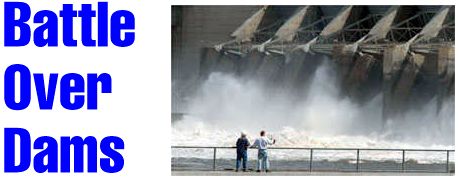forum
library
tutorial
contact

Oregon Leaps Into Dam Fray
by Mike LeeTri-City Herald, November 5, 1999
|
the film forum library tutorial contact |

|
Oregon Leaps Into Dam Frayby Mike LeeTri-City Herald, November 5, 1999 |

Oregon's attorney general joined environmentalists this week in pressing the Army Corps of Engineers to stop polluting the lower Snake River with its four dams.
In a court brief filed Monday, Oregon charges the dams are responsible for ongoing salmon-harming conditions - specifically, high water temperature and dissolved gases in the reservoirs. The brief urges the judge to reject Corps' attempts to wiggle off the hook on technicalities.
"The Corps should not be allowed to undermine (the water cleanup) process through its refusal to comply with state water quality standards," the Oregon brief stated, backing the National Wildlife Federation and the EarthJustice Legal Defense Fund.
"The Corps - like anyone else - must comply with the Clean Water Act."
Samantha Mace at the Washington and Idaho Wildlife Federations praised Oregon Gov. John Kitzhaber for standing against the dams.
"We are very pleased to see the governor actually taking a more active role in this than simply standing back like Gov. (Gary) Locke" of Washington, she said.
Dam defenders - already under siege from Alaska to Washington, D.C., - view Monday's court filing as another serious threat.
"Oregon's action (is) a major escalation of the lawsuit," said Bruce Lovelin, executive director of the Columbia River Alliance, an industry-based group trying to protect the four dams that provide irrigation, navigation and power production between Pasco and Lewiston.
"The Oregon approach is really a tag-team effort with the environmental-commercial fisherman plaintiffs to use the Clean Water Act to force dam breaching."
The dams are getting harder and harder to defend as they become the focus of national environmental efforts to restore fish habitat on the lower Snake River.
The Nez Perce Tribe also recently filed documents supporting the Wildlife Federation, an important factor because federal court judges largely have been sympathetic to tribal claims on salmon issues.
Washington has not filed a position paper with the court - though letters signed by state officials show concerns with Corps dams stretching back at least two years.
"They are coming at us from all sides," said Lovelin, who directs one of the few pro-dam interest groups trying to fend off the environmental push.
"It's quite overwhelming. We are entering an area right now that we have little experience in ... (and) we may not have a lot of time to learn."
An impassioned debate is expected this winter after the Corps and the National Marine Fisheries Service release plans for future Columbia-Snake operations.
EarthJustice is asking the Portland court to hear its case as soon as possible, setting up the possibility that arguments will overlap with release of the federal plans about how to restore fish.
Earlier this year, the Corps admitted its dams killed fish, but said the plaintiffs didn't have legal status to sue.
In any case, the Corps said, it's just following NMFS's 1995 biological opinion about how to prevent salmon and steelhead extinction.
Oregon argued in Monday's court document that just because the Corps is meeting the mandates of the Endangered Species Act does not mean it's meeting the Clean Water Act.
Expert testimony submitted this week by EarthJustice said the Corps has bypassed plenty of options to improve river conditions and its inaction is a major problem for near-extinct salmon.
Robert Heinith of the Columbia River Inter-Tribal Fish Commission said the Corps has failed to use water stored in Idaho's Dworshak reservoir to protect fish to the extent necessary.
He also suggested lowering the pool behind Lower Granite Dam by 23 feet during fish passage season to reduce water temperatures that build up in the large reservoirs.
Of course, Heinith said, dam breaching would end the problems, but it is "by no means the only action available to the Corps to resolve the ongoing violations of water quality standards."
Strangely, that is one place where tribes agree with dam defenders, many of whom have said more technical fixes should be attempted before tearing out the dams.
learn more on topics covered in the film
see the video
read the script
learn the songs
discussion forum
